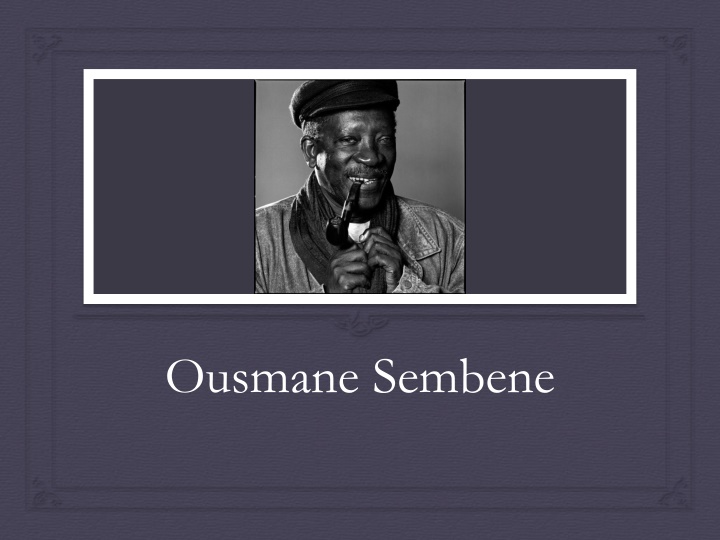Ousmane Sembene
Ousmane Sembene (1923-2007) was a renowned Senegalese filmmaker and writer, known for his important literary works and influential films that explored themes of power, tradition, and societal norms in African communities. His films, such as "Moolaadé" and "Xala," shed light on issues like female circumcision and the clash between modernity and tradition. Sembene's nuanced storytelling and focus on human nature make his work both entertaining and thought-provoking.
Download Presentation

Please find below an Image/Link to download the presentation.
The content on the website is provided AS IS for your information and personal use only. It may not be sold, licensed, or shared on other websites without obtaining consent from the author.If you encounter any issues during the download, it is possible that the publisher has removed the file from their server.
You are allowed to download the files provided on this website for personal or commercial use, subject to the condition that they are used lawfully. All files are the property of their respective owners.
The content on the website is provided AS IS for your information and personal use only. It may not be sold, licensed, or shared on other websites without obtaining consent from the author.
E N D
Presentation Transcript
Ousmane Sembene (1923-2007) Important literary works include: Les bouts de bois de Dieu (1960). Trans. God s Bits of Wood Le mandat (1966). Trans. The Money-Order Xala (1973). Trans. Xala Le dernier de l Empire (1981). Trans. The Last of the Empire Selected filmography: Borom Sarret (1963) Niaye (1964) La Noire de...(1966) Mandabi (1968) Emita (1971) Xala (1975) Ceddo (1977) Camp de Thiaroye (1988) Guelwaar (1992) Faat Kin (2000) Moolaad (2004)
One of the themes coiling beneath the surface of the film is that the women in this society have great power, if they are bold enough to exercise it. Among the most important items in [Mercenaire s] stock are batteries, needed for portable radios and flashlights in this district without electricity. The radio stations are in the cities, and broadcast words and music reflecting dangerous freedoms. When the frustrated all-male village council meets to ponder the challenge of Coll and moolaad , it doesn't occur to them, of course, that women might have perfectly good reasons for not wanting to be circumcised. They blame the outside. The radios. They order a sweep of the village to confiscate all the radios, which are deposited in a big pile, some of them still turned on. This pile becomes a central image of the film, and inevitably evokes bonfires of hated books, or videos, or [music], or people. The construction of Sembene's film is subtle and seductive. He spends little time denouncing female circumcision, and a great deal of time studying the human nature of dissent and conformity. There is humor in the paradoxes that the men debate, and in their impotence against their women, and suspense when the prodigal son returns from Paris. On the most fundamental of levels, this is an entertaining film. Also a beautiful one, as we admire the artistry of the architecture, and appreciate how the people of the village live within the rules and respect them, even when opposing them. These people, despite some of their practices, are deeply decent , and Sembene loves them for it. The movie contains less outrage than regret (Roger Ebert)
If you are working with actors who are not professionals, and you are trying to reproduce the language of real life you have to take special care with gestures and movement, to be careful not to destroy anything of the original atmosphere, nor destroying anything of their personality. Africans talk a lot. That doesn t mean that why they say doesn t make sense, but they do talk a lot I personally can speak/understand Wolof, Bambara, Malanke. Take for example the question of greeting. People will greet each other and go into some other matter and in the middle of the other matter they would suddenly start greeting each other out of the blue. The cinema is rational, therefore, you have to suppress the repetition of greetings, but if you tell non-professional actors this, they can t grasp it. The roundabout way of thinking, the ins and outs of thought, it is very difficult to get people to change them. So when you are rehearsing the actors, you have to rehears the language, gesture, and look, to make sure that there is no dead space
https://www.google.com/maps/search/djerisso+Burkina+Faso/@12.2381052,-3.8035852,7z/data=!3m1!4b1https://www.google.com/maps/search/djerisso+Burkina+Faso/@12.2381052,-3.8035852,7z/data=!3m1!4b1

